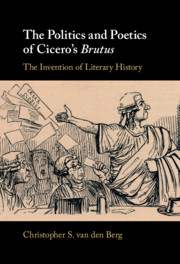Book contents
- The Politics and Poetics of Cicero’s Brutus
- The Politics and Poetics of Cicero’s Brutus
- Copyright page
- Dedication
- Contents
- Preface and Acknowledgments
- A Note on the Text
- Abbreviations
- Introduction
- Chapter 1 Ciceropaideia
- Chapter 2 The Intellectual Genealogy of the Brutus
- Chapter 3 Caesar and the Political Crisis
- Chapter 4 Truthmaking and the Past
- Chapter 5 Beginning (and) Literary History
- Chapter 6 Perfecting Literary History
- Chapter 7 Cicero’s Attici
- Chapter 8 Minerva, Venus, and Cicero’s Judgments on Caesar’s Style
- Conclusion
- References
- General Index
- Index Locorum
Chapter 8 - Minerva, Venus, and Cicero’s Judgments on Caesar’s Style
- The Politics and Poetics of Cicero’s Brutus
- The Politics and Poetics of Cicero’s Brutus
- Copyright page
- Dedication
- Contents
- Preface and Acknowledgments
- A Note on the Text
- Abbreviations
- Introduction
- Chapter 1 Ciceropaideia
- Chapter 2 The Intellectual Genealogy of the Brutus
- Chapter 3 Caesar and the Political Crisis
- Chapter 4 Truthmaking and the Past
- Chapter 5 Beginning (and) Literary History
- Chapter 6 Perfecting Literary History
- Chapter 7 Cicero’s Attici
- Chapter 8 Minerva, Venus, and Cicero’s Judgments on Caesar’s Style
- Conclusion
- References
- General Index
- Index Locorum
Summary
Chapter 8 turns to the famous judgment of Julius Caesar’s commentarii (nudi, recti, venusti, 262). Not only textual aesthetics but also visual analogies and the plastic arts underlie Cicero’s judgments. An analysis of statuary analogies and of the fuller contexts for Cicero’s statements suggests a deft ploy on his part. He portrays himself as Phidias crafting a statue of Minerva (the Parthenon Athena) and Caesar as Praxiteles crafting a statue of Venus (the Aphrodite of Knidos). The fundamentally different symbolic resonances of the goddesses simultaneously challenge Caesar’s military accomplishments and underscore Cicero’s civic achievements. Cicero thereby promotes his vision of the need to restore the Roman republic once the civil war has concluded.
Keywords
- Type
- Chapter
- Information
- The Politics and Poetics of Cicero's BrutusThe Invention of Literary History, pp. 217 - 243Publisher: Cambridge University PressPrint publication year: 2021

